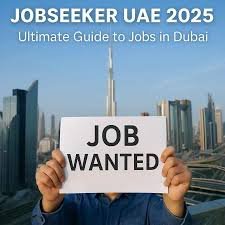Introduction: Chasing Dreams in the Desert
The UAE isn’t all ban glow, high-end automobiles, and perpetual sunshine—it’s also a destination for ambitious expats who want to take their careers to the next level. From Dubai’s glamour to Abu Dhabi’s cultural appeal, career enthusiasts around the globe fantasize about being part of this dynamic, tax-free economy. But let’s get real, getting a job in this place as an expat can be like driving through the desert without a compass.
That’s precisely why I created this guide.
As a person who has navigated the labyrinth of job sites, recruiter ghosting, and perplexing visa procedures, I understand the grind. In this blog post, I’ll demystify finding jobs in the UAE as an expat—step by step, with genuine advice, hands-on tools, and techniques that are effective in 2025.
Why the UAE is Still a Top Destination for Expats
Economic Resilience & Growth
In spite of worldwide uncertainties, the UAE has been remarkably resilient economically. The GDP growth of the country is projected to be 4.2% in 2025, according to the UAE Central Bank, led by the tourism, technology, logistics, and renewable energy industries.
Tax-Free Salaries & Multinational Workplaces
Let’s not forget the mammoth in the room: zero income tax. Add that to a multicultural, English-speaking workplace, and it’s no wonder that more than 8.9 million expatriates (nearly 89% of the population!) I live in the UAE.
Before You Begin: Know the UAE Job Market
The UAE isn’t one enormous buffet of jobs. There’s a demand curve stretching across every emirate and sector.
Hot Sectors in 2025:
- Tech & IT – Cloud computing, AI, cybersecurity, and app development.
- Healthcare – Especially nursing, general practitioners, and specialists.
- Hospitality & Tourism – Dubai Expo legacy and tourism resurgence.
- Green Energy – As the UAE pushes sustainability, this sector is booming.
- Logistics & Supply Chain – Thanks to Dubai’s role as a global transit hub.
Tip: Tailor your CV and pitch based on which industry you’re targeting. A software engineer’s path differs wildly from a hotel manager’s.
Step-by-Step Guide: How to Find Jobs in the UAE as an Expat
1. Fine-Tune Your CV for the UAE
UAE recruiters have specific expectations.
Key Tips:
- Keep it no longer than 2 pages.
- Include a professional photo (optional but still common here).
- Add personal details like nationality, visa status, and current location.
- Personalize each application to the job description—one-size-fits-all will not work.
Pro Tip: Employ UAE job templates on websites such as Bayt or Naukrigulf to format your resume the way local employers prefer.
2. Know Where to Look: Job Portals That Work
There are tons of job sites on the internet, but not all are effective in the UAE economy.
Best UAE Job Portals in 2025:
LinkedIn UAE The still strong king of non manual networking and job searching.
Naukri Gulf Particularly suitable for Indian expats and technical jobs.
Insider Tip: Many companies don’t post all openings. Sometimes, just applying via a direct company website or contacting a recruiter on LinkedIn works better.
3. Leverage LinkedIn Like a Pro
It’s 2025—if you’re not using LinkedIn strategically, you’re missing out.
Quick LinkedIn Optimization Tips:
- Turn on “Open to Work” and make it visual to scout
- Connect with UAE-based HR professionals and hiring managers.
- Interact with posts from potential employers—you want to be seen.
- Use hashtags that are pertinent:
“I got three interviews from simply commenting on a recruiter’s post and sending a personalized message,” says Riya, an Indian software developer now based in Sharjah.
4. Know Work Visas and Sponsorships
This section catches many newcomers off guard.
Two Main Routes:
- You get a job, and the employer sponsors your visa (normal procedure).
- You come on a visit visa and locally search for a job.
In 2022, the UAE launched a Job Seeker Visa (with validity of 60, 90, or 120 days), exclusively for foreigners looking at opportunities to work without a sponsor.
Basic Visa Requirements:
- Certified degree (for professional jobs)
- Valid passport
- Passport photos
- Background check (for certain industries)
5. Visit Job Fairs & Network Events
Sometimes, offline is better than online.
Events to Look Out for:
- Careers UAE Expo (Dubai World Trade Centre)
- Tawdheef (Abu Dhabi) – Emiratisation-focused, but great for networking.
- TechMeetups, LinkedIn Local Dubai, and other free network events on Meetup.com
These are gold for establishing real-life connections with recruiters and HR professionals. Come with printed resumes, a smile, and an elevator pitch.
6. Leverage Recruitment Agencies (But Be Intelligent)
Recruitment agencies can be of use if you choose the correct ones.
Reputable Agencies at the top:
- Michael Page UAE
- BAC Middle East
- Charterhouse
- Robert Half
- Adecco Middle East
7. Leverage the Strength of Referrals
In the UAE, your connections are what count in many cases—particularly in sectors such as real estate, media, and sales.
Ask your network for:
- Referrals
- Internal job opportunities
- Informational interviews
- Even a casual coffee meeting can lead to opportunities.
8. Think Freelance or Remote Work (Legally!)
As digital nomadism gains popularity, the UAE introduced various visa options.
Your Options in 2025:
Freelance Permits (Dubai, Abu Dhabi, Ras Al Khaimah)
- Green Visa – For freelancers and self-employed professionals
- Remote Work Visa – For remote workers employed by foreign companies
Fun Fact: Dubai was one of the initial cities worldwide to introduce a special visa for digital nomads.
Pros and Cons of Job Searching in the UAE as an Expat
Advantages Disadvantages
Tax-free income Competitive market
Worldly experience Expenses( particularly Dubai)
High-growth industries Visa reliance on employers
5. Visit Job Fairs & Network Events
Sometimes, offline is better than online.
Events to Look Out for:
- Careers UAE Expo (Dubai World Trade Centre)
- Tawdheef (Abu Dhabi) – Emiratization-focused, but great for networking.
- Tech Meetups, LinkedIn Local Dubai, and other free network events on Meetup.com
These are gold for establishing real-life connections with recruiters and HR professionals. Come with printed resumes, a smile, and an elevator pitch.
6. Leverage Recruitment Agencies (But Be Intelligent)
Recruitment agencies can be of use if you choose the correct ones.
Reputable Agencies at the top:
- Michael Page UAE
- BAC Middle East
- Charterhouse
- Robert Half
- Adecco Middle East
7. Leverage the Strength of Referrals
In the UAE, your connections are what count in many cases—particularly in sectors such as real estate, media, and sales.
Ask your network for:
- Referrals
- Internal job opportunities
- Informational interviews
- Even a casual coffee meeting can lead to opportunities.
8. Think Freelance or Remote Work (Legally!)
As digital nomadism gains popularity, the UAE introduced various visa options.
Your Options in 2025:
Freelance Permits (Dubai, Abu Dhabi, Ras Al Khaimah)
- Green Visa – For freelancers and self-employed professionals
- Remote Work Visa – For remote workers employed by foreign companies
Fun Fact: Dubai was one of the initial cities worldwide to introduce a special visa for digital nomads.
Pros and Cons of Job Searching in the UAE as an Expat
Advantages Disadvantages
Tax-free income Competitive market
Worldly experience Expenses( particularly Dubai)
High-growth industries Visa reliance on employers
Reasonable Expectations: How Long Does It Take?
Based on your industry and experience level, the job search could take 1 to 4 months. But do not be discouraged. Numerous expats found excellent positions by remaining relentless, enhancing their profile, and networking strategically.
Quick Story
Zahid (Logistics professional from Pakistan) did 80+ online apps without any success, yet, with a new LinkedIn profile, a job fair attended, and a direct recruiter connection landed him two offers within a month.
Bonus Tips for Standing Out in the UAE Job Market
- Get certifications relevant to your field (e.g., PMP, CFA, AWS).
- Take short courses at platforms like Coursera or Udemy—recruiters notice!
- Learn Arabic (even the basics)—it’s a bonus for you.
- Follow up after an interview or application always.
How to Tap the Hidden Job Market:
- Talk to employees working for companies you respect and seek guidance (not employment).
- Visit industry-related meetups or webinars.
- Private WhatsApp groups or Telegram channels of professionals in your field.
- Connect with UAE based scout and firm pages on LinkedIn and interact regularly.
Reasonable Expectations: How Long Does It Take?
Based on your industry and experience level, the job search could take 1 to 4 months. But do not be discouraged. Numerous expats found excellent positions by remaining relentless, enhancing their profile, and networking strategically.
Quick Story
Zahid (Logistics professional from Pakistan) did 80+ online apps without any success, yet, with a new LinkedIn profile, a job fair attended, and a direct recruiter connection landed him two offers within a month.
Bonus Tips for Standing Out in the UAE Job Market
- Get certifications relevant to your field (e.g., PMP, CFA, AWS).
- Take short courses at platforms like Coursera or Udemy—recruiters notice!
- Learn Arabic (even the basics)—it’s a bonus for you.
- Follow up after an interview or application always.
How to Tap the Hidden Job Market:
- Talk to employees working for companies you respect and seek guidance (not employment).
- Visit industry-related meetups or webinars.
- Private WhatsApp groups or Telegram channels of professionals in your field.
- Connect with UAE based recruiters and firm pages on LinkedIn and depend on them regularly.
The Place of Emiratization in Your Job Search
Nationalization touches on the UAE government’s initiative to boost the rate of Emiratis working in capitalism . This has an implication for some jobs and professions—particularly admin, HR, and finance—where businesses are required to put UAE nationals first.
How This Impacts Expats:
Expats working in areas such as tech, engineering, healthcare, and construction are less impacted.
If you’re applying for banking or HR positions, there will be greater competition or preference for UAE nationals.
Workaround Tip: If you’re in a profession becoming Emirates, shift to positions where you can specialize or lead international teams—these tend to be more difficult to localize.
Salary Expectations and Negotiation in the UA
Let’s discuss money—since negotiating your remuneration package in the UAE is essential. As opposed to most Western nations, offers of employment here allow for bargaining—not only salary but also accommodation, transportation, and airfare allowances.
What’s Usually Part of UAE Remuneration Packages:
- Basic salary
- Housing allowance
- Transportation allowance
- Annual air ticket to your home country
- Medical insurance
- Gratuity (end-of-service benefit)
Tip: Be aware that sometimes the job may give you AED 12,000/month as the overall package, but you receive only AED 8,000 as basic salary. This has an impact on your gratuity calculation, so know the split before you sign.
Cost of Living Reality Check
While UAE salaries are tax free, the cost of living especially in cities like Dubai and Abu Dhabi can be high.
Average Monthly Expenses (2025 Estimates):
- Rent (1-bedroom apartment): AED 4,500–7,000
- Utilities & Internet: AED 800–1,200
- Groceries & Food: AED 1,500–2,500
- Transportation: AED 400–800 (public), AED 1,500+ (car)
Tip: If your salary doesn’t include a housing allowance, avoid signing a lease until you’ve explored shared accommodations or areas like Deira, Bur Dubai, or Al Nahda.
Advantages of Being Present in the UAE While Looking for a Job:
- Quicker interviews and responses
- Increased exposure to local recruiters
- Availability for walk-in drives or job fairs
But it is accompanied by cost (e.g., rent, transport, visa fee) if you do not get a job soon. That is where the UAE Job Seeker Visa excels—it allows you 60–120 days of legally seeking employment without a sponsor.
Red Flags to Avoid
Sadly, the UAE labor market is not scam- and scam-free. Here’s what to avoid like plague:
- Job offers that demand money upfront
- Spams claiming to offer work visas
- “Too good to be true” entry-level wages
- Agents who say they can find you employment if you “just pay a small fee”
Real employers will never request you to pay for hiring. If they do, leave.
Learn Local Workplace Etiquette & Culture
Even if you’re an expert in your profession, cultural knowledge can cause you to succeed sooner.
Key Cultural Tips
- The workweek is Monday to Friday (Friday is half-day in some companies).
- Show up on time—but be patient, as meetings tend to begin late.
- Avoid politics, religion, or liquor in a professional environment.
- English is prevalent, but throwing in some Arabic greetings such as “As-salamu alaykum” will win you friends.
Adhering to cultural norms doesn’t just get you hired—it keeps you hired and helps you advance.
Conclusion: Your UAE Dream Job Is Closer Than You Think
Getting a job in the UAE as an expat is not always a walk in the park, but with the right approach, forbearance, and local knowledge, it’s definitely achievable.
Stay proactive. Update your online presence. Build real relationships
Whether you’re aiming for the skyscrapers of Dubai or the growing tech parks of Abu Dhabi your opportunity might just be one connection or click away.
Practical Takeaway:
- Polish your CV for UAE norms.
- Apply smart, not hard—use top platforms.
- Network both online and offline.
- Understand visa laws and don’t rush into illegal arrangements.









